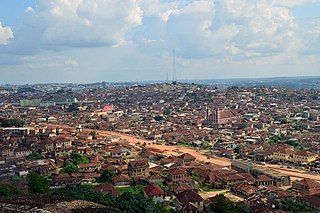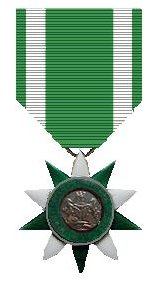Related Research Articles

The president of Nigeria, officially the president of the Federal Republic of Nigeria, is the head of state and head of government of the Federal Republic of Nigeria. The president directs the executive branch of the Federal Government and is the commander-in-chief of the Nigerian Armed Forces.

Chief Moshood Kashimawo Olawale Abiola, also known as M. K. O. Abiola was a Nigerian business magnate, publisher, and politician. He was the honorary supreme military commander of the Oyo Empire and an aristocrat of the Egba clan.

Moshood Abiola National Stadium is a multipurpose national sports stadium located in Abuja, in the Federal Capital Territory of Nigeria. The stadium serves as a home to the Nigerian national football team, as well as a center for various social, cultural, and religious events. The Federal Government of Nigeria approved the contract for the construction of the National Stadium complex and Games Village on 18 July 2000. The stadium was constructed to host the 8th All Africa Games which took place in October 2003. On Wednesday, 12 June 2019, President Muhammadu Buhari announced the change of the name of the National Stadium, Abuja to Moshood Abiola National Stadium after former Nigerian politician chief M.K.O. Abiola. President Buhari made this pronouncement during his speech at the Democracy Day celebration at the Eagle Square, Abuja.

Babagana Kingibe OV GCON is a Nigerian diplomat, politician and civil servant who has held several high ranking government offices, culminating in his appointment as the Secretary to the Government of the Federation from 2007 to 2008. He spent over a decade in the Foreign Service cadre and has been in politics since the 1970s, serving six heads of state; most recently as a member of the inner circle of President Muhammadu Buhari.
Abubakar Dangiwa Umar was governor of Kaduna state in Nigeria from August 1985 to June 1988 during the military regime of General Ibrahim Babangida. After retiring from the army in 1993, he became a social critic and the founder of Movement for Unity and Progress, a political party.

Atiku Abubakar ; born 25 November 1946) is a Nigerian politician and businessman who served as the vice president of Nigeria from 1999 to 2007 during the presidency of Olusegun Obasanjo. He ran for the office of governor of Adamawa State in 1990 and 1996 unsuccessfully, but won in 1998. Before he was sworn in, he was selected as running mate to former military leader, Olusegun Obasanjo, during the 1999 presidential election and was re-elected in 2003.

General elections were held in Nigeria on 21 April 2007 to elect the President and National Assembly. Governorship and State Assembly elections had been held on 14 April.

Corruption is an anti-social attitude awarding improper privileges contrary to legal and moral norms and impairs the authorities' capacity to secure the welfare of all citizens. Corruption in Nigeria is a constant phenomenon. In 2012, Nigeria was estimated to have lost over $400 billion to corruption since its independence.

The Fourth Republic is the current republican government of Nigeria. Since 1999, it has governed the country according to the fourth republican constitution. Nigeria adopted the constitution of the Fourth Republic on 29 May 1999.

The Third Republic was the planned republican government of Nigeria in 1992 which was to be governed by the Third Republican constitution. In the Third Republic, there were democratically elected state governors and state assemblies and a democratically elected federal legislature. The republic was however not fully democratic as there was no democratically elected civilian president. The then military president Ibrahim Babangida's supposed transition eventually turned out to be a ploy to keep executive powers and grant the National Assembly limited legislative powers. Hence all laws passed by the Senate and House of Representatives will have to pass the National Defence and Security Council of Nigeria and finally approved by the President. So while Babangida changed the usual style adopted by preceding military leaders from Head of State to president, he will continue to postpone presidential elections and eventually annul the ultimate one held on 12 June 1993. The Third Republic can thus be described as half military and half civilian.

The Independent National Electoral Commission (INEC) is the electoral body which oversees elections in Nigeria. It was established in 1998 shortly before Nigeria's transition from military to civilian rule.
Okoh Ebitu Ukiwe is a retired Commodore in the Nigerian Navy who served as the de facto Vice President of Nigeria under military head of state General Ibrahim Babangida from 1985 to 1986.

Kayode Oladele is a Nigerian human rights activist, lawyer and politician who was a member of the Nigerian House of Representatives representing Yewa North/Imeko-Afon Federal Constituency, Ogun State, from 2015–2019. He was the Chairman of the House of Representatives' Committee on Financial Crimes and member of the House Committees on Justice, Human Rights, Rules and Business, Environment, Healthcare Services and Agricultural Institutions. He was elected under the platform of the All Progressives Congress on 11 April 2015. Prior to that, he was Chief of Staff, office of the Chairman, Economic and Financial Crimes Commission (EFCC), a law enforcement agency that investigates financial crimes.

Abeokuta is the capital city of Ogun State in southwest Nigeria. It is situated on the east bank of the Ogun River, near a group of rocky outcrops in a wooded savanna; 77 kilometres (48 mi) north of Lagos by railway, or 130 kilometres (81 mi) by water. As of 2006, Abeokuta and the surrounding area had a population of 449,088.
Abdulkareem Adisa was a Nigerian major general who was military governor of Oyo State during the military regime of General Ibrahim Babangida. He was convicted for involvement in an attempted coup against military head of state General Sani Abacha in 1997, and was on death row when Abacha died in June 1998. He was subsequently pardoned.
Alhaji Sa'idu Barda is a Nigerian politician who was elected on the National Republican Convention (NRC) platform as Governor of Katsina State, Nigeria, holding office between January 1992 and November 1993 during the Nigerian Third Republic. He remained active in politics in the Nigerian Fourth Republic.

Presidential elections were held in Nigeria on 12 June 1993, the first since the 1983 military coup ended the country's Second Republic. The elections were the outcome of a transitional process to civilian rule spearheaded by the military ruler, Ibrahim Badamasi Babangida. The unofficial result of the election – though not declared by the National Electoral Commission (NEC) – indicated a victory for Moshood Kashimawo Olawale Abiola of the Social Democratic Party (SDP), who defeated Bashir Tofa of the National Republican Convention (NRC). The winner of the election was thus never declared as the elections were annulled by Babangida, citing electoral irregularities. The annulment led to protests and political unrest, including the resignation of Babangida and a weak interim civilian government, and culminated in the continuation of military rule in the country with Sani Abacha ascending to power as the military head of state via a bloodless coup later in the year.

The Order of the Federal Republic (OFR) is one of two orders of merit, established by the Federal Republic of Nigeria in 1963. It is senior to the Order of the Niger.

The Olusegun Obasanjo Presidential Library is a library owned by Chief Olusegun Obasanjo, a former President of Nigeria. It is a historic, tourist and academic centre established as a national archive for the preservation of documents and materials used by the president during his tenure as the president of Nigeria. The library is located at Oke Mosan Abeokuta, Ogun State in Nigeria.
References
- ↑ Okogba, Emmanuel (2022-06-15). "2022 Democracy Day celebrations: Significant highlights from the president's speech". Vanguard News. Retrieved 2022-12-22.
- ↑ "Why I made June 12 Democracy Day -Buhari". Punch Newspapers. 2021-06-12. Retrieved 2022-12-22.
- ↑ Eze, Ogemdi Uchenna (2021-05-04). "From 29 May to 12 June: Journalistic Framing of Change in the Date of the Commemoration of Democracy Day in Nigeria". Critical Arts. 35 (3): 1–16. doi:10.1080/02560046.2021.1956556. ISSN 0256-0046.
- ↑ Agbalajobi, Damilola (11 June 2019). "June 12 is now Democracy Day in Nigeria. Why it matters". The Conversation. Retrieved 2022-12-22.
- ↑ "History of June 12 in Nigeria, how MKO Abiola become symbol of democracy and why e dey important to di Yoruba pipo". BBC News Pidgin. Retrieved 2024-06-16.
- ↑ "Letter to MKO Abiola on Democracy Day". TheCable. 2022-06-11. Retrieved 2022-08-01.
- ↑ Report, Agency (2019-06-11). "Democracy Day: Why June 12 is more significant than May 29 - Tinubu". Premium Times Nigeria. Retrieved 2022-12-22.
- ↑ Mohsin, Haroon (2022-07-08). "Nigeria Independence Day". National Today. Retrieved 2022-12-23.
- ↑ "How first coup still haunts Nigeria 50 years on". 2016-01-15. Retrieved 2019-04-29.
- ↑ "The Trans-Pacific, Volume 24, Issue 24 - 1936-06-11". Manchuria Daily News Online. doi:10.1163/36722_meao_transpacific_1936-06-11-007 . Retrieved 2024-02-14.
- ↑ "Democracy in Nigeria and the need for change - Daily Trust". dailytrust.com/. 2014-06-08. Retrieved 2024-06-16.
- ↑ "Buhari declares June 12 Democracy Day, honours Abiola with GCFR". Punch Newspapers. Retrieved 2018-06-07.
- ↑ Unamka, Sampson (12 September 2020). "Attih Soul Shines Bright In RMF - The Nation" . Retrieved 2021-01-01.